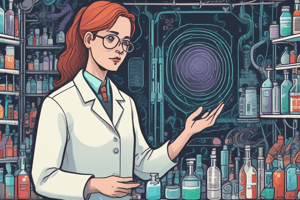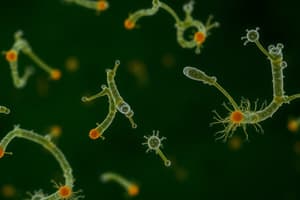Podcast
Questions and Answers
What percentage of microorganisms are pathogens?
What percentage of microorganisms are pathogens?
- 3% (correct)
- 10%
- 1%
- 50%
Who is credited with disproving the theory of spontaneous generation?
Who is credited with disproving the theory of spontaneous generation?
- Antony Van Leeuwenhock
- Louis Pasteur (correct)
- Corynebacterium diphtheriae
- Clostridium tetani
What is the term for the microorganisms that are naturally found in the human body?
What is the term for the microorganisms that are naturally found in the human body?
- Microbiota (correct)
- Pathogens
- Microflora
- Indigenous Microorganisms
What is the term for the theory that living organisms arise from non-living matter?
What is the term for the theory that living organisms arise from non-living matter?
What is the name of the Dutch tradesman who is considered the 'Father of Microbiology'?
What is the name of the Dutch tradesman who is considered the 'Father of Microbiology'?
What is the term for the microorganisms that are not capable of causing disease?
What is the term for the microorganisms that are not capable of causing disease?
What is the primary contribution of Robert Koch in the field of microbiology?
What is the primary contribution of Robert Koch in the field of microbiology?
What is the primary focus of Industrial Microbiology?
What is the primary focus of Industrial Microbiology?
What is the term used to describe the complete removal of all life forms, including endospores?
What is the term used to describe the complete removal of all life forms, including endospores?
What is the primary aim of Koch's Postulates?
What is the primary aim of Koch's Postulates?
Which branch of microbiology deals with the study of microorganisms as biofertilizers and biocontrol agents of plant pathogens?
Which branch of microbiology deals with the study of microorganisms as biofertilizers and biocontrol agents of plant pathogens?
What is the focus of Environmental Microbiology?
What is the focus of Environmental Microbiology?
Flashcards are hidden until you start studying
Study Notes
Introduction to Microbiology
- Microbiology is the study of very small living organisms, including bacteria, algae, protozoa, fungi, and viruses.
- Microorganisms are required to be studied using a microscope.
Microorganisms
- Microorganisms (MOs) include bacteria, algae, protozoa, fungi, and viruses.
- Viruses are infectious agents or particles.
- Only 3% of known microorganisms are pathogens, while 97% are non-pathogens, and 87% are beneficial.
- Indigenous microflora or microbiota refers to microorganisms that are naturally present in a specific environment.
- Microorganisms are ubiquitous, meaning they are present everywhere.
Historical Background
- The concept of microorganisms was initially suggested by the spread of diseases, which implied the existence of invisible, transmissible agents of infection.
- Antony Van Leeuwenhoek referred to microorganisms as "animalcules".
- The theory of spontaneous generation suggested that living organisms arise from decomposing organic matter, but this was later disproven.
The Golden Age of Microbiology
- Louis Pasteur showed that microbes cause fermentation and spoilage, disproved spontaneous generation, and developed aseptic techniques.
- Pasteur's work laid the foundation for modern microbiology.
Experiment of Pasteur
- Pasteur's experiment demonstrated the role of microorganisms in fermentation and spoilage.
Microbiology and Medicine
- The germ theory of disease states that diseases are transmitted by microorganisms from a diseased to a healthy person.
- Examples of diseases caused by microorganisms include diphtheria (caused by Corynebacterium diphtheriae) and tetanus (caused by Clostridium tetani).
Robert Koch
- Robert Koch developed solid growth media, pure culture techniques, simple stain techniques, and aseptic lab techniques.
- Koch isolated bacteria as causative agents for anthrax.
Koch's Postulates
- Koch's Postulates are a series of experimental steps to show that a specific organism causes a specific disease.
Spores and Sterilization
- Ferdinand Cohn discovered and described endospores.
- The term "sterile" means the complete removal of all life forms, including endospores.
Branches of Microbiology
- Basic Microbiology: classifications, metabolism, metabolic pathways, nutrition, growth, and its requirements.
- Medical Microbiology: human pathogens.
- Industrial Microbiology: microorganisms used to obtain industrial products.
- Pharmaceutical Microbiology: production of drugs, enzymes, solvents, alcohols, etc. by microorganisms.
- Agricultural Microbiology: microorganisms used as biofertilizers and biocontrol agents of plant pathogens.
- Environmental Microbiology (Microbial Ecology): pollution of soil, air, and water, and biodegradation of toxic chemicals by various microorganisms.
Studying That Suits You
Use AI to generate personalized quizzes and flashcards to suit your learning preferences.




